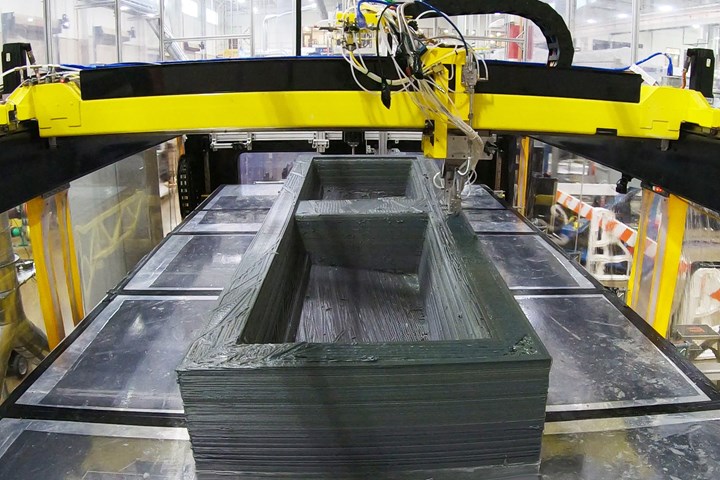MVP releases new model of RAM system for thermoset materials
New large-format AM machine model, RAM 48, maximizes production efficiency and enables custom build dimensions when fabricating thermoset materials.
Magnum Venus Products (MVP, Knoxville, Tenn., U.S.), a global manufacturer of fluid movement and production solutions for industrial applications, is launching a new model of its Reactive Additive Manufacturing (RAM) system to enable cost-effective medium- and large-scale fabrication of thermoset materials. The new model, named RAM 48, has a print area of 4′ x 8′ with modular, expandable 4′ x 4′ sections to allow for custom build dimensions.
Since the launch of the RAM system in 2019, MVP says it has discovered new applications for this technology, designing RAM 48 to complement its original RAM 816 model and take full advantage of these breakthroughs. According to Mike Kastura, director of product management at MVP, harnessing the potential of 3D printing with thermosets is just beginning.
Thermosets contain polymers which chemically react in the curing process, cross-linking between printed layers to form a powerful bond, and resulting in stronger, more heat-tolerant products. According to MVP, these inherent properties enable printing with open layer times, which creates the ability to pick and place items into the print, such as heating channels or sensors to monitor part specifications. Another benefit is the ability to print multiple parts simultaneously, and print through a previous path, enabling more complex designs than before. Thermosets also enable secondary bonding of materials, making it easier and faster to achieve a Class A surface finish, join two parts or quickly repair a damaged mold.

Photo Credit: Magnum Venus Products
The RAM 48 model is already making waves in the additive manufacturing (AM) industry, the company notes, pointing to a recent preorder of the RAM 48 model by Mississippi State University Advanced Composites Institutes, with plans to develop transformative composite technologies for its industry partners using the RAM system.
Developed in collaboration with scientists at Oak Ridge National Laboratory (ORNL, Knoxville, Tenn., U.S.), the RAM system was the first to successfully produce large-scale prints of thermoset materials, MVP contends. Polynt-Reichhold (Durham, N.C., U.S.) also designed a specialty print media to use in the RAM system, PRD-1520. The team earned a CAMX ACE award in 2019 and was a finalist for 2021 for developing a novel method to produce unsupported 90º overhangs in large-scale thermoset printing.
Related Content
-
Jeep all-composite roof receivers achieve steel performance at low mass
Ultrashort carbon fiber/PPA replaces steel on rooftop brackets to hold Jeep soft tops, hardtops.
-
PEEK vs. PEKK vs. PAEK and continuous compression molding
Suppliers of thermoplastics and carbon fiber chime in regarding PEEK vs. PEKK, and now PAEK, as well as in-situ consolidation — the supply chain for thermoplastic tape composites continues to evolve.
-
Plant tour: Joby Aviation, Marina, Calif., U.S.
As the advanced air mobility market begins to take shape, market leader Joby Aviation works to industrialize composites manufacturing for its first-generation, composites-intensive, all-electric air taxi.













.jpg;maxWidth=300;quality=90)

